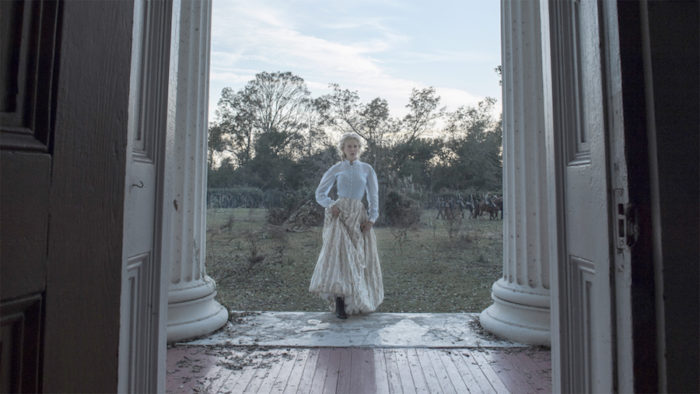VOD film review: The Beguiled
Review Overview
“Bring me the anatomy book.”
8Lasting impact
6Josh Slater-Williams | On 25, Mar 2018
Director: Sofia Coppola
Cast: Colin Farrell, Nicole Kidman, Kirsten Dunst, Elle Fanning, Oona Laurence
Certificate: 15
Watch The Beguiled online in the UK: BBC iPlayer / Apple TV (iTunes) / Prime Video (Buy/Rent) / TalkTalk TV / Google Play
Thomas P. Cullinan’s 1966 Southern Gothic novel A Painted Devil was previously brought to the screen, under the title of The Beguiled, by director Don Siegel in 1971. An American Civil War-set tale of an injured union soldier taking refuge in a Virginian girls’ school, Siegel’s version was led by regular collaborator Clint Eastwood. For Sofia Coppola’s stab at the material, although Colin Farrell is top-billed as the stranger sowing seeds of mistrust, things are determinedly more female-focused.
Farrell plays Colonel John McBurney, who is found wounded by Amy (Oona Laurence), one of the youngest girls at the nearby school. She brings him back there, to the initial chagrin of headmistress Miss Martha (Nicole Kidman) and the four other girls (Elle Fanning and The Nice Guys scene-stealer Angourie Rice among them), who worry about having a ‘blue belly’ soldier in their midst. Nonetheless, they decided to do the honourable, Christian thing and nurse him back to health, before later turning the man in to Confederate soldiers the next time some pass by the school. But that plan never quite comes to fruition as the women gradually all succumb to his charms, with schoolteacher Edwina (Kirsten Dunst) being the first. John himself becomes more beguiled with them, as well as with the possibility of their home becoming a safe house for him to sit out the remainder of the war. But when envy and John’s attempt to have his fingers in multiple pies results in further additions to his injuries, the man turns into a physical threat for those he has bewitched.
The narrative here is largely the same as in Siegel’s film and Cullinan’s novel, albeit with the notable removal of a black slave character, a decision that fuelled some controversy around the time of the film’s theatrical release. Taking Coppola’s own comments about the cut out of the equation, one can view the choice as a means of focusing the atmosphere more around sex, rather than a more political bent to the dynamics that might be there were the character present.
Your mileage will vary as to whether the film suffers in any way from the excision, but a sensual atmosphere is certainly achieved. Near every frame in Coppola’s film is intoxicating, while Dunst, in particular, is very moving as a repressed woman whose lust overwhelms her.
And yet, there’s something missing. Despite the story’s veer into psychosexual thriller territory and dark humour in the third act, there’s a curious lack of momentum to proceedings; the intoxication is, at times, more like lethargy. That said, the film, at a neat 94 minutes, is concise, lacking Coppola’s more traditional drifty pacing, but it might have had a more lasting impact if it did go a bit more off the plot point-hitting route.
The Beguiled is available on BBC iPlayer until 15th October 2021




















